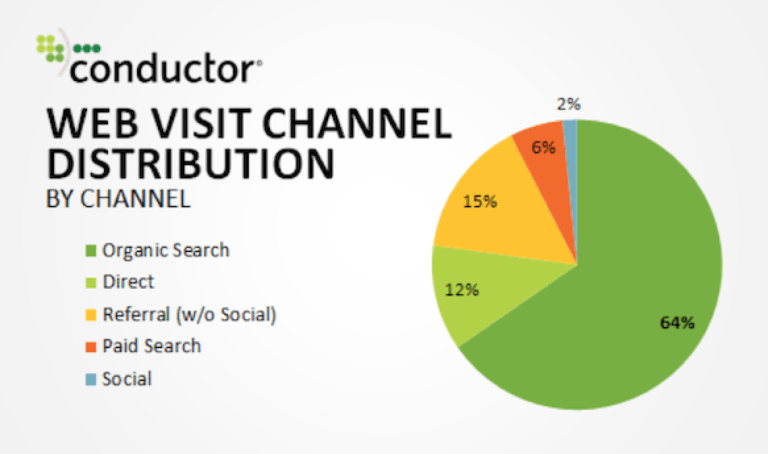The latest article on http://searchengineland.com/seo-industry-worth-65-billion-will-ever-stop-growing-248559 surely paints a positive picture and an assured growth path for the SEO Industry and I surely cannot agree more about its optimistic future.
Call it by any name inbound marketing or by any other name organic search presence is here to stay as long as there are quality search engines on the world wide web. The main reason being that organic search presence results are considered to be more trust worthy than the paid results by the user.
As the image below indicates that most of the targeted traffic usually comes from the search engines.
The 4 factors mentioned against the growth of the SEO industry in the above mentioned article are also a blessing or a boon in disguise.
As I am a die hard optimist, especially when it comes to the growth of the search industry, I list my views regarding these 4 factors as follows:
Jayson Demers writes:
Factors against unlimited growth
And now, some of the reasons why SEO may face an eventual halt or decline:
- Competition and prohibitive costs. SEO spend rising means that more businesses are getting involved in SEO. That means more competition to deal with. For a while, this will be fine, but eventually the cost of entry will become prohibitive, and there will be a “tipping point” where the rise in spending tapers off.
My View:
The competition will surely increase and there can be an initial turbulence but, as SEO is an art and science that cannot be mastered in a day or for that matter by attending any training sessions alone, the experienced SEOs will surely be preferred. The experienced lot or the SEO companies who have seen the rise of this industry will surely demand their price contributing to the reputation of the SEO industry. There will be a stark demarcation of experienced SEOs who may charge a higher fee and the new entrants who may charge comparatively very low. But, sooner or later the website owners will see through this and the willingness to pay a higher amount will also increase. Search presence is a valuable digital asset for any company and the new entrants may not have the expertise of experienced SEOs and the price you pay by getting your site penalised by search engines is surely something no website owner will be willing to pay.
Jayson Demers writes:
- The Knowledge Graph and visibility decline. Thanks to the Knowledge Graph (and similar future technological developments), users are being given more immediate forms of answers, reducing their reliance on individual site visitations to find what they’re looking for. This could eventually start compromising the ROI of SEO, pushing people out of the game.
My View:
Instead of pushing people out of the game, the Knowledge Graph and other forms in search results is making SEOs focus more on quality metrics like search queries, landing pages location, time on site, new sessions, pages per session, bounce rate, etc. rather than only rankings as an ROI. As knowledge graph is earned as a result of quality web presence and popularity, SEO will be considered as a true platform for earned media and this will carve a niche for SEO services where website owners will ultimately develop the mindset of earning the search presence patiently over a period of time rather that ask for quick results. And believe me we are heading towards it.
Jayson Demers writes:
- Alternative search modes. Search is starting to evolve in some weird forms, including personal digital assistants, which marry online and device-specific search. These alternative modes of search are harder to predict and harder to “rank” for, since oftentimes they forgo a “ranking” process entirely.
My View :
As mentioned , it is still evolving and at a very initial stage. Moreover, this will take some time to emerge on the global scene.
Jayson Demers writes:
- RankBrain and decreasing rank predictability. Machine learning is already huge, and it’s only getting bigger. Technologies like RankBrain are starting to upgrade search systems in real time, with processes only AI programs can incorporate. That’s going to make it harder and harder to accurately assess ranking factors and respond accordingly.
My View:
The semantic web will be the future if RankBrain gets implemented extensively. This will not only increase the quality of the search results but also reduce the focus on the keyword rich content. This will shift the focus to more meaningful and correlated content related to the topic. Moreover, SEOs will have to work on adding content using schemas which presents content in form of a dataset rather than only text using simple HTML tags.This adds value to the SEO work, making the SEO work more technical. When you add value to your work, you can demand the price too.The current manipulation of meta tags and other on-page factors resulting to spam will surely show a decline. Hence, this will be a plus point for genuine SEOs rather than the other way round.
RankBrain the machine-learning artificial intelligence system is a software which is integrated into the algorithm to mathematically connect words and phrases. As Semantics add extra information to help the search engine with the meaning of the information, websites using Schemas will be able to get more correlated to the contextual content.
I am sure SEOs who have seen the industry grow since 2000 will agree to what Gabby Williams has to say :
"We make it look easy on the court... because we practice until we cannot get it wrong anymore."
May 10, 2016





